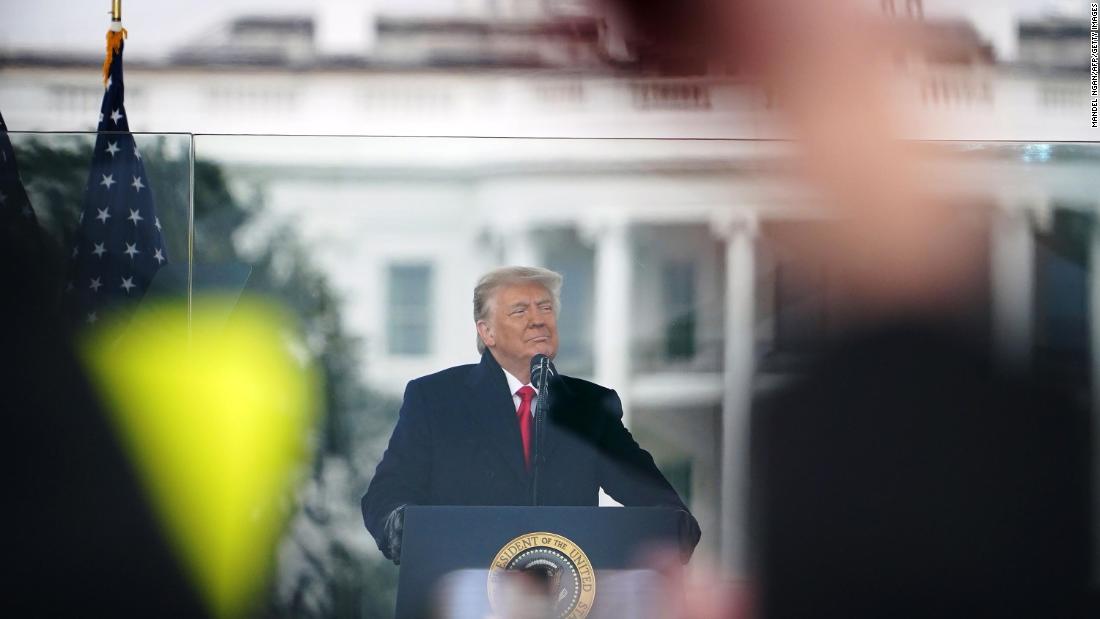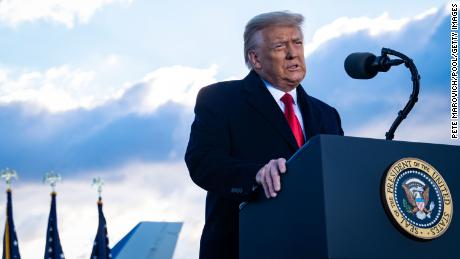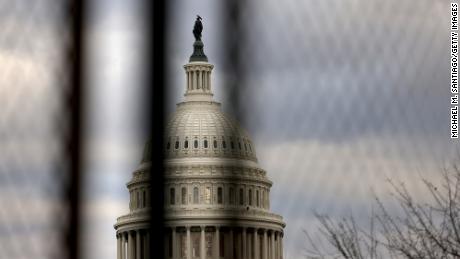Managers show rioters violently attacking Capitol to begin trial
The video was an early sign about how the House impeachment managers intend to confront senators with the violent events of the riot and charge that Trump is culpable for inciting the insurrectionists that attacked the Capitol and placed their lives in danger. The opening session of the trial was a debate on the constitutionality of the trial itself, but Democrats quickly turned their attention to the harrowing attack on the Capitol.
The Democrats’ 13-minute video concluded with Trump’s deleted tweet on January 6, saying that “these are the things and events that happen when a sacred landslide election victory is so unceremoniously & viciously stripped away.”
Senators on both sides turned away from the video from time to time as it played on monitors, the yelling of the mob echoing in the chamber that rioters had breached. When the video ended, there was silence in the chamber before Raskin spoke again.
“If that’s not an impeachable offense, then there’s no such thing,” Raskin argued.
Arguments on constitutionality on Tuesday’s docket
Trump’s team will have two hours to respond to the managers before the Senate will vote later Tuesday on the constitutionality of the trial for a former president. Trump’s lawyers have countered that Trump did not incite the riot, and that his speech about the election was protected by the First Amendment.
After the video opening, Raskin and Democratic Rep. Joe Neguse of Colorado walked through the history of impeachment and how it was written in the Constitution, arguing there was sufficient precedent to hold a trial for Trump. Raskin used a series of writings to argue the Framers indeed intended impeachment to be a tool that could be used even after an official left office. Raskin said that in fact, one of the Founders’ key concerns was protecting against politicians who came into office as “demagogues” and left as “tyrants.”
“President Trump may not know a lot about the framers, but they certainly knew a lot about him,” Raskin said. “Given the framers’ intense focus on dangers to elections and the peaceful transfer of power, it is inconceivable they designed impeachment to be a dead letter in a president’s final days in office.”
The Democrats argued that Trump’s team was trying to create a “January exception” that would create a loophole for presidents to commit impeachable offenses just before leaving office.
“Presidents can’t inflame insurrection in their final weeks and then walk away like nothing happened,” Neguse said. “And yet that is the rule that President Trump asks you to adopt.”
Trial schedule comes into focus
The Senate plans to continue the trial every day until it concludes, including the weekend, after an initial planned break for the Shabbat holiday on Friday evening was scrapped. Democratic senators came away from a conference call Tuesday morning with Senate Majority Leader Chuck Schumer under the belief that a final vote on conviction could occur Sunday or Monday if there are no witnesses, according to multiple senators on the call. Republican senators discussed the possibility the trial could wrap up by Saturday evening if there are no witnesses, according to two senators.
House managers have not yet requested witnesses but are preserving that option in case they need witnesses’ testimony to rebut an argument made by the Trump team, which would extend the length of the trial into at least next week. The timing is also a bit uncertain because it’s unclear how much time the Trump team will use, though they’re not expected to use their full 16 hours.
After the House managers and Trump’ team make their presentation Tuesday, the Senate will vote on whether the trial is constitutional. While that vote could halt the trial if the Senate voted it was unconstitutional, a similar procedural vote forced by GOP Sen. Rand Paul of Kentucky failed 55-45 last month.
Senior House aides on the impeachment team argued Tuesday that once the Senate votes on the constitutional question, which only needs a majority vote, it should be considered settled like any other trial motion.
But while Democrats are sure to win this vote, the constitutionality question looms over the entirety of the trial, because Republicans have coalesced around the argument as a reason to acquit Trump. Conviction requires two-thirds majority, or at least 17 Republican senators, to join all members of the Democratic caucus.
Democrats have argued there’s plenty of precedent to hold the trial for Trump, who was impeached by the House while he was still in office. They’ve pointed to legal scholars from both sides of the political spectrum saying the Senate has jurisdiction to convict Trump, as well as the Senate precedent holding trials previously for former officials who were impeached.
Trump’s lawyers and many Republican senators, however, say they believe the trial is unconstitutional because Trump is no longer president.
Last month, five Republican senators voted against Paul’s motion to dismiss the trial, and it’s not clear if there have been any shifts.
“I don’t know of anyone that their mind is not made up ahead of the impeachment trial,” said Sen. James Lankford, an Oklahoma Republican. “The first question on the issue of constitutionality, that drives a lot of it and everything else. I think people are pretty locked down.”
A different kind of trial
Unlike the last trial, senators will not be required to sit at their desk throughout the proceedings, due to the Covid-19 pandemic. They will be able to instead watch from the gallery above the Senate chamber or in a room off the floor that will show the trial on television. Masks will not be required on the floor, unlike on the House floor, but the expectation is the managers and Trump’s lawyers will wear masks unless they are speaking.
As the trial got underway, all senators were wearing masks except Paul, who has long argued that he’s immune after having Covid early last year. It’s still unclear if those who have had coronavirus remain immune to the virus. Other senators, however, who have had coronavirus or been vaccinated for the disease, still wear masks.
Senators are not allowed to speak during the trial as jurors.
After Tuesday’s debate and vote, the House managers will have 16 hours over two days to make their presentation beginning Wednesday, followed by two days for Trump’s lawyers. Senators will then have four hours to ask questions submitted in writing to both sides, and the Senate could debate and vote on whether to subpoena witnesses, though it remains unclear whether any will be sought at trial.
This story and headline have been updated with additional developments Tuesday.
CNN’s Ryan Nobles contributed to this report.
![]()






